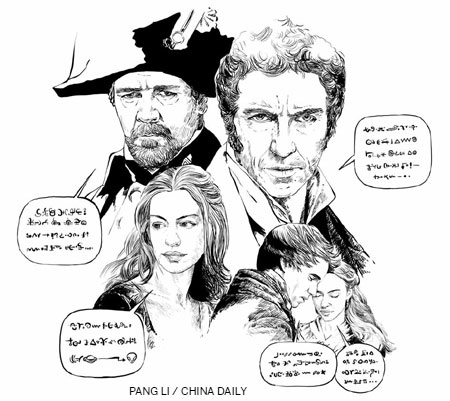
Good translation for movies makes you forget the actors on screen are speaking a language you do not understand; bad translation, such as the one for Les Miserables, makes you wish you had mastered that foreign language.
The movie version of Les Miserables has caught many in China by surprise, and part of the reason is in its Chinese translation. As a sung-through musical, it did not get the usual treatment of dubbing, which, in retrospect, would have been an interesting experiment.
Anyway, the 2-hour 38-minute film bored some to the exit, while moving many more to tears. Of those who were touched by the fate of Fantine or felt uplifted by the values of Valjean, quite a few were disgusted at the level of translation. It doesn't take an expert to know that the Chinese subtitles are way below par.
For one thing, there are dozens of mistakes. The first jumped out at you in the opening scene when Javert orders Valjean to "retrieve the flag". It was turned into "lower the flag" in Chinese. Well, the flag was already lying on the floor, for God's sake.
Granted, you cannot render every English word literally into Chinese. But this translator made strange choices. When literal translation is good enough, he would extrapolate. Fantine's singing of her encounter with a young man who slept with her and then deserted her is couched in tender imagery, but the Chinese rendition opted for the blunt and brutal, adding details that are not in the original lyrics. Paradoxically, the word "Lucifer" in Javert's song was given a transliteration, which means a viewer has to have taken several courses in both English language and religion to know that line.
On top of it, the translator seemed to be oblivious of the fact that both Victor Hugo's literary classic and the 1958 French film have gained wide popularity in China and most of the proper nouns in the story have generally accepted Chinese equivalents already. For example, Inspector Javert has always been "Police chief Shawei", and now it suddenly became "Investigator Jiaweier".
I have no idea who was responsible for hiring the translator, who, by the way, is not even mentioned in the superimposed Chinese credits. Could it be Universal Pictures' Chinese office, or the Chinese distributor of the movie? Whoever it is did not conduct due diligence. As it turns out, there are musical aficionados who had been vying with each other in coming up with singable lyrics, which are much more difficult to pull off than a simple conversion with no regard to syllables and tones. Any of the versions available on Chinamusical.net is better than the one used for the theatrical release. All one needs to do is license it, and hopefully have someone double-checking with the movie lyrics.
